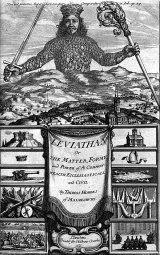Leviathan Page #4
Leviathan or The Matter, Forme and Power of a Common-Wealth Ecclesiasticall and Civil—commonly referred to as Leviathan—is a book written by Thomas Hobbes (1588–1679) and published in 1651 (revised Latin edition 1668). Its name derives from the biblical Leviathan. The work concerns the structure of society and legitimate government, and is regarded as one of the earliest and most influential examples of social contract theory.
CHAPTER III. OF THE CONSEQUENCE OR TRAYNE OF IMAGINATIONS By Consequence, or Trayne of Thoughts, I understand that succession of one Thought to another, which is called (to distinguish it from Discourse in words) Mentall Discourse. When a man thinketh on any thing whatsoever, His next Thought after, is not altogether so casuall as it seems to be. Not every Thought to every Thought succeeds indifferently. But as wee have no Imagination, whereof we have not formerly had Sense, in whole, or in parts; so we have no Transition from one Imagination to another, whereof we never had the like before in our Senses. The reason whereof is this. All Fancies are Motions within us, reliques of those made in the Sense: And those motions that immediately succeeded one another in the sense, continue also together after Sense: In so much as the former comming again to take place, and be praedominant, the later followeth, by coherence of the matter moved, is such manner, as water upon a plain Table is drawn which way any one part of it is guided by the finger. But because in sense, to one and the same thing perceived, sometimes one thing, sometimes another succeedeth, it comes to passe in time, that in the Imagining of any thing, there is no certainty what we shall Imagine next; Onely this is certain, it shall be something that succeeded the same before, at one time or another. Trayne Of Thoughts Unguided This Trayne of Thoughts, or Mentall Discourse, is of two sorts. The first is Unguided, Without Designee, and inconstant; Wherein there is no Passionate Thought, to govern and direct those that follow, to it self, as the end and scope of some desire, or other passion: In which case the thoughts are said to wander, and seem impertinent one to another, as in a Dream. Such are Commonly the thoughts of men, that are not onely without company, but also without care of any thing; though even then their Thoughts are as busie as at other times, but without harmony; as the sound which a Lute out of tune would yeeld to any man; or in tune, to one that could not play. And yet in this wild ranging of the mind, a man may oft-times perceive the way of it, and the dependance of one thought upon another. For in a Discourse of our present civill warre, what could seem more impertinent, than to ask (as one did) what was the value of a Roman Penny? Yet the Cohaerence to me was manifest enough. For the Thought of the warre, introduced the Thought of the delivering up the King to his Enemies; The Thought of that, brought in the Thought of the delivering up of Christ; and that again the Thought of the 30 pence, which was the price of that treason: and thence easily followed that malicious question; and all this in a moment of time; for Thought is quick. Trayne Of Thoughts Regulated The second is more constant; as being Regulated by some desire, and designee. For the impression made by such things as wee desire, or feare, is strong, and permanent, or, (if it cease for a time,) of quick return: so strong it is sometimes, as to hinder and break our sleep. From Desire, ariseth the Thought of some means we have seen produce the like of that which we ayme at; and from the thought of that, the thought of means to that mean; and so continually, till we come to some beginning within our own power. And because the End, by the greatnesse of the impression, comes often to mind, in case our thoughts begin to wander, they are quickly again reduced into the way: which observed by one of the seven wise men, made him give men this praecept, which is now worne out, Respice Finem; that is to say, in all your actions, look often upon what you would have, as the thing that directs all your thoughts in the way to attain it. Remembrance The Trayn of regulated Thoughts is of two kinds; One, when of an effect imagined, wee seek the causes, or means that produce it: and this is common to Man and Beast. The other is, when imagining any thing whatsoever, wee seek all the possible effects, that can by it be produced; that is to say, we imagine what we can do with it, when wee have it. Of which I have not at any time seen any signe, but in man onely; for this is a curiosity hardly incident to the nature of any living creature that has no other Passion but sensuall, such as are hunger, thirst, lust, and anger. In summe, the Discourse of the Mind, when it is governed by designee, is nothing but Seeking, or the faculty of Invention, which the Latines call Sagacitas, and Solertia; a hunting out of the causes, of some effect, present or past; or of the effects, of some present or past cause, sometimes a man seeks what he hath lost; and from that place, and time, wherein hee misses it, his mind runs back, from place to place, and time to time, to find where, and when he had it; that is to say, to find some certain, and limited time and place, in which to begin a method of seeking. Again, from thence, his thoughts run over the same places and times, to find what action, or other occasion might make him lose it. This we call Remembrance, or Calling to mind: the Latines call it Reminiscentia, as it were a Re-Conning of our former actions. Sometimes a man knows a place determinate, within the compasse whereof his is to seek; and then his thoughts run over all the parts thereof, in the same manner, as one would sweep a room, to find a jewell; or as a Spaniel ranges the field, till he find a sent; or as a man should run over the alphabet, to start a rime. Prudence Sometime a man desires to know the event of an action; and then he thinketh of some like action past, and the events thereof one after another; supposing like events will follow like actions. As he that foresees what wil become of a Criminal, re-cons what he has seen follow on the like Crime before; having this order of thoughts, The Crime, the Officer, the Prison, the Judge, and the Gallowes. Which kind of thoughts, is called Foresight, and Prudence, or Providence; and sometimes Wisdome; though such conjecture, through the difficulty of observing all circumstances, be very fallacious. But this is certain; by how much one man has more experience of things past, than another; by so much also he is more Prudent, and his expectations the seldomer faile him. The Present onely has a being in Nature; things Past have a being in the Memory onely, but things To Come have no being at all; the Future being but a fiction of the mind, applying the sequels of actions Past, to the actions that are Present; which with most certainty is done by him that has most Experience; but not with certainty enough. And though it be called Prudence, when the Event answereth our Expectation; yet in its own nature, it is but Presumption. For the foresight of things to come, which is Providence, belongs onely to him by whose will they are to come. From him onely, and supernaturally, proceeds Prophecy. The best Prophet naturally is the best guesser; and the best guesser, he that is most versed and studied in the matters he guesses at: for he hath most Signes to guesse by.
Translation
Translate and read this book in other languages:
Select another language:
- - Select -
- 简体中文 (Chinese - Simplified)
- 繁體中文 (Chinese - Traditional)
- Español (Spanish)
- Esperanto (Esperanto)
- 日本語 (Japanese)
- Português (Portuguese)
- Deutsch (German)
- العربية (Arabic)
- Français (French)
- Русский (Russian)
- ಕನ್ನಡ (Kannada)
- 한국어 (Korean)
- עברית (Hebrew)
- Gaeilge (Irish)
- Українська (Ukrainian)
- اردو (Urdu)
- Magyar (Hungarian)
- मानक हिन्दी (Hindi)
- Indonesia (Indonesian)
- Italiano (Italian)
- தமிழ் (Tamil)
- Türkçe (Turkish)
- తెలుగు (Telugu)
- ภาษาไทย (Thai)
- Tiếng Việt (Vietnamese)
- Čeština (Czech)
- Polski (Polish)
- Bahasa Indonesia (Indonesian)
- Românește (Romanian)
- Nederlands (Dutch)
- Ελληνικά (Greek)
- Latinum (Latin)
- Svenska (Swedish)
- Dansk (Danish)
- Suomi (Finnish)
- فارسی (Persian)
- ייִדיש (Yiddish)
- հայերեն (Armenian)
- Norsk (Norwegian)
- English (English)
Citation
Use the citation below to add this book to your bibliography:
Style:MLAChicagoAPA
"Leviathan Books." Literature.com. STANDS4 LLC, 2025. Web. 5 Feb. 2025. <https://www.literature.com/book/leviathan_192>.








Discuss this Leviathan book with the community:
Report Comment
We're doing our best to make sure our content is useful, accurate and safe.
If by any chance you spot an inappropriate comment while navigating through our website please use this form to let us know, and we'll take care of it shortly.
Attachment
You need to be logged in to favorite.
Log In